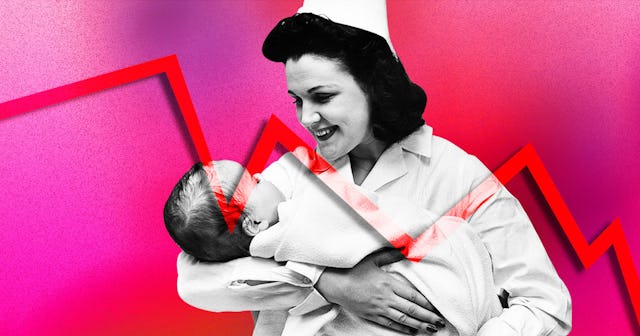Folks Were Socially Distant In Their Bedrooms Too––No COVID Baby Boom

In the earliest days of the pandemic, the memes predicting a baby boom ran rampant. The assumption was that couples stuck at home with their partners would have nothing else to do but make babies. The memes were especially focused on couples who didn’t already have a child trying to navigate quarantine and distance learning.
The to-be generation even had a few nicknames—the “coronials” and the “quaranteens.”
But, instead of a baby boom, we’re experiencing a baby bust. Birth rates have plummeted to an all-time low. Phil Cohen, a sociologist at the University of Maryland, noted in an interview with CBS News, that this drop is the biggest he’s witnessed since 1964, when the baby boom ended.
Several state health departments are reporting significant declines in birth rates in December 2020. (That’s nine months after COVID was declared a pandemic by the World Health Organization, for those who don’t want to do the math.) The early data show an approximate 7.3% decline in births. In California, that decline is closer to 10% and in Hawaii, closer to 30%. Both states reported approximately 35,000 less births in December.
While these numbers are startling, it’s important to keep in mind that we won’t know the full extent of this baby bust for a while, yet. Preliminary birth data for the first six months of 2021, won’t be out until the fall, according to Phillip Levine, an economics professor at Wellesley University in Massachusetts.
But researchers have estimates. Levine and Melissa Kearney, an economics professor at the University of Maryland, published a report, which was recently updated, projecting approximately 300,000 fewer births in 2021.
Researchers have also found that Google searches for contraception, sex, and pregnancy, all declined in 2020, according to Cohen.
Why Did The Baby Boom Become A Baby Bust?
Malte Mueller/Getty
One explanation is that the so-called coming baby boom was never anything more than a meme. A survey conducted by the Guttmacher Institute in the early days of the pandemic found that 40% of women changed their childbearing plans. One-third planned to delay pregnancy or have few children due to the pandemic.
It could be a case of history repeating itself. The 1918 Spanish Flu pandemic was followed by a large decline in births.
More likely, the reason for decline in birth rates is multi-factored and incorporates social, economic, and emotional components.
“The economic fallout, persistent health concerns, uncertainty about the safety and availability of medical care and the closure of schools all combine to make this a very unappealing time for couples to start or expand their family,” said Emily Smith-Greenaway, an associate professor of sociology and spatial sciences at the University of Southern California, said in an interview with HuffPost.
What Does A Baby Bust Mean For Society?
A large decline in the number of births might not seem that relevant on the individual level. But, a decline speaks to present trouble and could be a major cause for concern in the future.
In the shorter-term, the decline in birth rates is a sign that people are struggling, according to Cohen. “Regardless of whether you think it’s good or bad to have a lot of children, the fact that we’re suddenly having fewer means things are not going well for a lot of people.”
It’s entirely unsurprising that if folks are concerned about what tomorrow might hold, have lost their jobs, or are experiencing food or housing insecurity, they don’t want to bring a baby into the world.
In the long-term, when considered in light of the fact that the birth rate has been on the decline in the United States since 2007, the decline could have an impact on the economy and on social security. Less babies means, eventually, less adults entering the workforce. Less adults in the workforce mean less people contributing toward social security, which is funded by taxes imposed on current workers.
“If you think about following kids through their lifespans, you’re talking about school enrollments falling for the next couple of years. You’re talking about a smaller college entry cohort,” Levine said, in an interview with Insider. “A little bit after that, you’re talking about entering the labor force.”
A single bad year for births isn’t a huge deal for the society and the economy, says Levine. But if the trend continues, there could be trouble.
The question then becomes whether the baby boom is coming once the pandemic ends. Researchers have doubts. “We certainly anticipate there to be a rebound, but we’re not so sure about an overshoot ― a boom that helps to offset the bust,” Smith-Greenaway said to HuffPost. “The longer this economic and public health crisis persists, the more likely these births aren’t just delayed, but will be averted entirely.”
Like with so many aspects of COVID, we won’t know the full effect the pandemic has had on birth rate until the pandemic is behind us. Maybe not even for many years after. But either way, the effects of the pandemic will be far reaching and studied for decades to come.